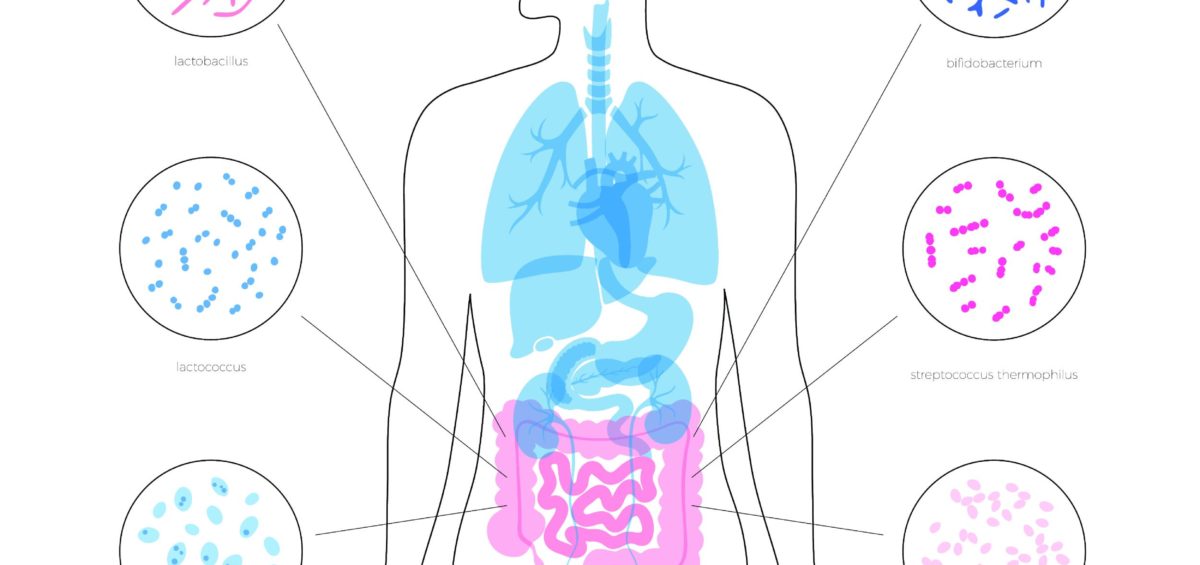
Research is only just discovering the significance of our gut bacteria and its importance for our metabolic health. Metabolic health is a composite measure that considers our blood sugar levels, weight and waist circumference, blood pressure, cholesterol levels, and our blood lipid levels.
The gut microbiome weighs up to 2kg (4.5lbs) heavier than the average human brain, and is composed of a vast community of bacteria, fungi, viruses, and archaea collectively known as the gut microbiota. It is often referred to as an organ or second brain. Located in the large intestine and consisting of billions of microorganisms, the microbiome is engaged in helping turn food into energy.
The larger our variety of gut microbes the better our health. For our microbes to work best they require a rich diet of fiber, up to 30g a day. To strengthen our microbiome, we should avoid low fiber, refined, processed foods and high sugar diets.
Medications, particularly antibiotics, diet and the environment all have an impact on our microbiome by influencing the gut flora. Obesity, chronic inflammation, and decline in brain function may all be associated with poor gut health. (1)
The microbiome of each person is complex and unique. Studying the microbiome helps us understand better why a person can eat a diet high in fats and refined carbohydrates and not gain weight while another person on an identical diet pile on the pounds.
There is a pronounced difference in the microbiome of a lean individual compared to that of an obese individual and research supports that the quality of gut flora may have a greater influence on our weight than our genetics.
Short chain fatty acids (SCFA) are produced by bacterial fermentation of fiber and resistance starches in the gut microbiome and support healthy metabolism and immune function. Butyrate is a SCFA produced by the fermentation of carbohydrate and in healthy individuals the colonies that produce this compound are high. Increasing bacterial metabolites such as butyrate may help in maintaining healthy and normal metabolic health. (2)
SCFA are readily absorbed back through the intestinal wall into the body and are one of the keys to maintaining immune cell function linking our immune defense directly with the state of our gut health.
It is estimated that up to 70% of your immune system is found in the gut. (3)
The gut is directly connected to the brain and other organs. Recent research has found that the gut microbiome influences mental health. (4)
A diet rich in fiber slows down digestion, helps you feel fuller for longer, supports healthy blood sugar and cholesterol levels.
If you look at the diversity of microbes in the gut of populations living in the ‘blue zones’, those areas in the world where the inhabitants live the longest and healthiest lives, they show a broad diversity of microbes due to a diet rich in phytonutrients staying clear of processed foods.
The good news is that changes in diet can positively influence the microbiome in a relatively short time.
Simple steps to improve your gut microbiome
Increase the following in your daily diet
- Fiber especially resistant starch (natural wholegrains)
- Beans and legumes
- Nuts and seeds
- Fermented foods like kimchi, kefir and kombucha
Plus
- Widen the variety of vegetables and fruit
- Keep skins on veggies and fruit
And avoid the following
- Naked carbohydrates (refined carbohydrates)
- Processed foods with added sugar and salt
- Artificial sweeteners
- Davis CD. The Gut Microbiome and Its Role in Obesity Nutr Today, 2016; 51 (4): 167–174. doi: 10.1097/NT.0000000000000167
- Harsch IA and Konturek PC. The Role of Gut Microbiota in Obesity and Type 2 and Type 1 Diabetes Mellitus: New Insights into “Old” Diseases. Med Sci (Basel), 2018; 6 (2): 32. doi: 10.3390/medsci6020032
- Vighi G, Marcucci F, Sensi G, Di Cara G, and Frati F. Allergy and the gastrointestinal system. Clin Exp Immunol., 2008; 153 (Suppl 1): 3–6. doi: 10.1111/j.1365-2249.2008.03713.x
- Johnson D, Thurairajasingam S, Letchumanan V, Chan K-G, and Lee L-H. Exploring the Role and Potential of Probiotics in the Field of Mental Health: Major Depressive Disorder. Nutrients, 2021, 13 (5), 1728. DOI: 3390/nu13051728

